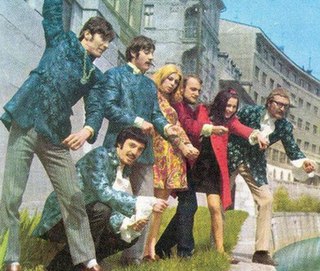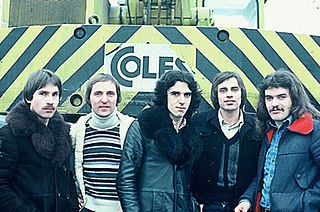In the minds of many foreigners, Slovenian folk music means a form of polka that is still popular today, especially among expatriates and their descendants. However, there are many styles of Slovenian folk music beyond polka and waltz. Kolo, lender, štajeriš, mafrine and šaltin are a few of the traditional music styles and dances.

Siddharta is a five-piece Slovenian alternative rock band formed in 1995. They are named after the 1922 novel by the German writer Hermann Hesse, Siddhartha.
Rock and roll is a musical genre from the United States, popularized worldwide beginning in the 1950s. Though rock had become popular earlier, it was not until the mid-1980s breakthrough of Laibach, who are now internationally renowned, that Slovenian rock became well-known. Other well-known Slovenian rock bands include Hic et Nunc, whose 1998 tour of the United States brought even more international attention to Slovenian rock.

Neisha, born on January 5, 1982, in Ljubljana, is a Slovenian pianist and pop singer.
Buldožer was a Yugoslav-Slovenian progressive rock band from the 1970s and 1980s. They were one of the first bands in communist Yugoslavia that could be considered Avant-prog, and forefathers of the Yugoslav new wave. In musical sense, they experimented with a variety of genres, while most of their lyrics, written in Serbo-Croatian, were a satire and mockery of the political and musical establishment, themselves included.

"Mama Weer All Crazee Now" is a song by the British rock band Slade, released in 1972 as the lead single from their third studio album Slayed? It was written by lead vocalist Noddy Holder and bassist Jim Lea, and produced by Chas Chandler. It reached No. 1 in the UK, giving the band their third number one single, and remained in the charts for ten weeks. In the United States, the song reached No. 76.

Dan D is a Slovenian rock band, formed in 1996 in Novo Mesto. They have released 5 studio albums to date.
Punk rock in Yugoslavia was the punk subculture of the former Socialist Federal Republic of Yugoslavia. The most developed scenes across the federation existed in the Socialist Republic of Slovenia, the Adriatic coast of the Socialist Republic of Croatia, the Socialist Autonomous Province of Vojvodina and Belgrade, the capital of both Yugoslavia and the Socialist Republic of Serbia. Some notable acts included: Pankrti, Paraf, Pekinška patka, KUD Idijoti, Niet, Patareni and KBO!.
Popular music in Yugoslavia includes the pop and rock music of the former SFR Yugoslavia, including all their genres and subgenres. The scene included the constituent republics: SR Slovenia, SR Croatia, SR Bosnia and Herzegovina, SR Montenegro, SR Macedonia and SR Serbia and its subunits: SAP Vojvodina and SAP Kosovo. The pop and rock scene was a part of the general Music of Yugoslavia, which also included folk, classical music, jazz etc. Within Yugoslavia and internationally, the phrases ex-YU or ex-Yugoslav Pop and Rock both formally and informally generally to the SFRY period, though in some cases also to its successor the FR Yugoslavia including Serbia and Montenegro which existed until 2006.

Slovene culture is the culture of the Slovenes, a south Slavic ethnic group. It is incredibly diverse for the country's small size, spanning the southern portion of Central Europe, being the melting pot of Slavic, Germanic and Romance cultures while encompassing parts of the Eastern Alps, the Pannonian Basin, the Balkan Peninsula and the Mediterranean.
Zgornje Škofije is a village in the City Municipality of Koper in the Littoral region of Slovenia. The settlement is made up of the hamlets of Druga Škofija, Tretja Škofija, Četrta Škofija, and Rombi, in increasing elevation.

Videosex was a Yugoslav synth-pop band formed in Ljubljana in 1982.

Lojze Slak was a Slovenian musician. Slak was one of the pioneers of Slovene popular folk music, based on diatonic button accordion and author of several evergreen songs, performed by his Lojzeta Slaka Ansamble.
Agropop was a Slovenian pop band.

September was a Slovenian and Yugoslav rock band formed in Ljubljana in 1975. They were one of the most prominent acts of the 1970s Yugoslav rock scene.

Jože Privšek, who also presented himself with the pseudonyms Jeff Conway and Simon Gale, was one of the most acclaimed Slovene jazz and pop musicians. He was a pianist, vibraphonist, composer, and conductor.

Bele Vrane were a Yugoslav rock band formed in Ljubljana in 1966.

Jutro was a Yugoslav rock band formed in Ljubljana in 1970. Initially performing boogie rock and later turning towards jazz rock, Jutro was a prominent act on the Yugoslav rock scene in the 1970s.

Predmestje was a Yugoslav jazz rock band formed in Ljubljana in 1977.












